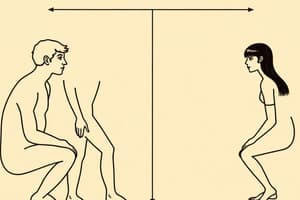Podcast
Questions and Answers
Which body part is the primary focus of gratification during the oral phase?
Which body part is the primary focus of gratification during the oral phase?
- Feet
- Genitals
- Anus
- Mouth (correct)
What can result from fixation during the oral phase?
What can result from fixation during the oral phase?
- Ambition and pride
- Dependence on others (correct)
- Excessive cleanliness
- Rigid control over others
What character trait might develop from fixation during the anal phase?
What character trait might develop from fixation during the anal phase?
- Lack of ambition
- Inability to form relationships
- Hoarding behaviors (correct)
- Self-centeredness
What psychological conflict arises during the anal phase due to toilet training?
What psychological conflict arises during the anal phase due to toilet training?
What occurs if a child is over-satisfied in a particular psychosexual stage?
What occurs if a child is over-satisfied in a particular psychosexual stage?
Which of the following traits can stem from the anal phase?
Which of the following traits can stem from the anal phase?
What is a defining characteristic of primary narcissism during the oral phase?
What is a defining characteristic of primary narcissism during the oral phase?
How does fixation during psychosexual development affect future development?
How does fixation during psychosexual development affect future development?
What is the primary focus of the genital phase according to Freud?
What is the primary focus of the genital phase according to Freud?
Which of the following best describes the phallic character traits?
Which of the following best describes the phallic character traits?
What does the Oedipal complex in Freud's theory involve?
What does the Oedipal complex in Freud's theory involve?
How does Hartmann's theory conceptualize the autonomy of the ego?
How does Hartmann's theory conceptualize the autonomy of the ego?
What is a potential outcome of limited genital productivity according to Freud?
What is a potential outcome of limited genital productivity according to Freud?
Which stage focuses on the resolution of the Oedipal conflict through the formation of the superego?
Which stage focuses on the resolution of the Oedipal conflict through the formation of the superego?
During which stage do sexual instincts become dormant?
During which stage do sexual instincts become dormant?
What is a key concept introduced by Hartmann in regard to the ego?
What is a key concept introduced by Hartmann in regard to the ego?
In the absence of love, what can work become, according to the content?
In the absence of love, what can work become, according to the content?
What concept connects Hartmann’s theory to Erikson’s psychosocial development theory?
What concept connects Hartmann’s theory to Erikson’s psychosocial development theory?
Flashcards
Libido in Developmental Phases
Libido in Developmental Phases
The focus of sexual pleasure shifts to different body parts during different stages of development.
Fixation
Fixation
When a child doesn't successfully move to the next stage of psychosexual development, some of their libido gets stuck in the previous stage, affecting their personality development.
Oral Phase
Oral Phase
The mouth is the primary source of pleasure and satisfaction during this stage. Think nursing, sucking, and exploring with the mouth.
Ego Development in the Oral Phase
Ego Development in the Oral Phase
Signup and view all the flashcards
Anal Phase
Anal Phase
Signup and view all the flashcards
Optimal Resolution of the Anal Phase
Optimal Resolution of the Anal Phase
Signup and view all the flashcards
Anal Character Traits - Control & Order
Anal Character Traits - Control & Order
Signup and view all the flashcards
Anal Character Traits - Opposite Traits
Anal Character Traits - Opposite Traits
Signup and view all the flashcards
Phallic Phase
Phallic Phase
Signup and view all the flashcards
Oedipus Complex
Oedipus Complex
Signup and view all the flashcards
Latency Period
Latency Period
Signup and view all the flashcards
Genital Phase
Genital Phase
Signup and view all the flashcards
Sublimation
Sublimation
Signup and view all the flashcards
Ego Autonomy
Ego Autonomy
Signup and view all the flashcards
Primary Autonomous Ego Functions
Primary Autonomous Ego Functions
Signup and view all the flashcards
Secondary Autonomy
Secondary Autonomy
Signup and view all the flashcards
Ego-Strength
Ego-Strength
Signup and view all the flashcards
Neutralization
Neutralization
Signup and view all the flashcards
Study Notes
Psychosexual Development
- Partial Instincts: Erotic sensations focus on specific body parts (mouth, anus, genitals).
- Libido in Stages: Libido attaches to different body areas during developmental stages, each with a focus on sexual pleasure.
- Fixation: If a child doesn't progress to the next stage (due to unmet or over-satisfied needs), some libido remains, impacting later development. This reluctance or inability leads to less energy for future stages.
- Freudian Libido: Energy of sexual instinctual origin; becomes fixated to pregenital zones if needs aren't met or are overly satisfied; creating less energy for future stages.
Stages of Psychosexual Development
Oral Phase
- Focus: Mouth (nursing, sucking).
- Gratification: Child's needs met through oral stimulation.
- Ego Development: Learning self vs. external world.
- Primary Narcissism: Self-contained pleasure; no self/other distinction initially.
- Character Traits (fixation): Dependence, passivity, excessive oral satisfaction (smoking, overeating).
Anal Phase
- Focus: Anus (pleasure from retaining/eliminating waste).
- Conflict: Toilet training creates ambivalence (pleasure vs. parental conflict).
- Character Traits (fixation):
- Control & Order: Ambition, pride, over-control, cleanliness.
- Opposite Traits: Sloppiness, lack of control, material irresponsibility.
- Additional Traits: Anal pride, omnipotence (superiority, workaholism, rigidity).
- Optimal Relationship: Balanced control (retaining/possessing/releasing) resolves ambivalence.
- Origins: Envy, hostility, etc., can stem from either oral or anal stages.
- Hoarding: Extreme difficulty discarding, linked to anxiety, fear of loss, and potential unresolved conflicts (anal-retentive).
Phallic Phase
- Focus: Genitals.
- Gender Differences: Curiosity about sex differences.
- Oedipal Complex:
- Desire: Unconscious desire for opposite-sex parent.
- Conflict: Want to replace/harm same-sex parent (boys fear castration).
- Freud's Example: Personal experience with love for mother, jealousy of father, and threats about genitals.
- Resolution: Development of the superego (internalizing rules).
- Character Traits (fixation): Desire, competition, or guilt.
Latency Period
- Inactive Sexual Instincts: Sexual energy is dormant, focused on learning and social activities.
Genital Phase
- Mature Sexuality: Final phase with fully mature sexuality.
- Satisfaction: Fulfillment through work, relationships, and sexual satisfaction.
- Optimal Adjustment: Healthy adjustment, balancing love and work.
- Sublimation: Id impulses redirected to acceptable activities (work, creativity).
- Limited Genital Productivity: Suppression may manifest in abnormal interests (money obsession).
- Love vs. Work: Lack of love may lead to work substituting for emotional fulfillment.
Hartmann's Reformulation of the Ego
- Id and Ego Development: Id and ego arise from the same source, with different paths.
- Ego Autonomy: Ego can function independently of id impulses.
- Primary Autonomous Ego Functions:
- Develop in a conflict-free environment.
- Include perception, thinking, language, intuition, comprehension, learning, motor function.
- Independent Energy Resources: Ego develops its own energy, operating independently of the id.
- Neutralization: Ego manages conflicts, maintaining autonomy.
- Secondary Autonomy: Ego incorporates instinctual drives into conflict-free functioning; changing how it operates.
- Ego Strength: Correlated with ego’s ability to neutralize conflicts.
- Impact on Later Theories: Contributing to Erikson's Psychosocial Development and Object Relations Theory.
Studying That Suits You
Use AI to generate personalized quizzes and flashcards to suit your learning preferences.




